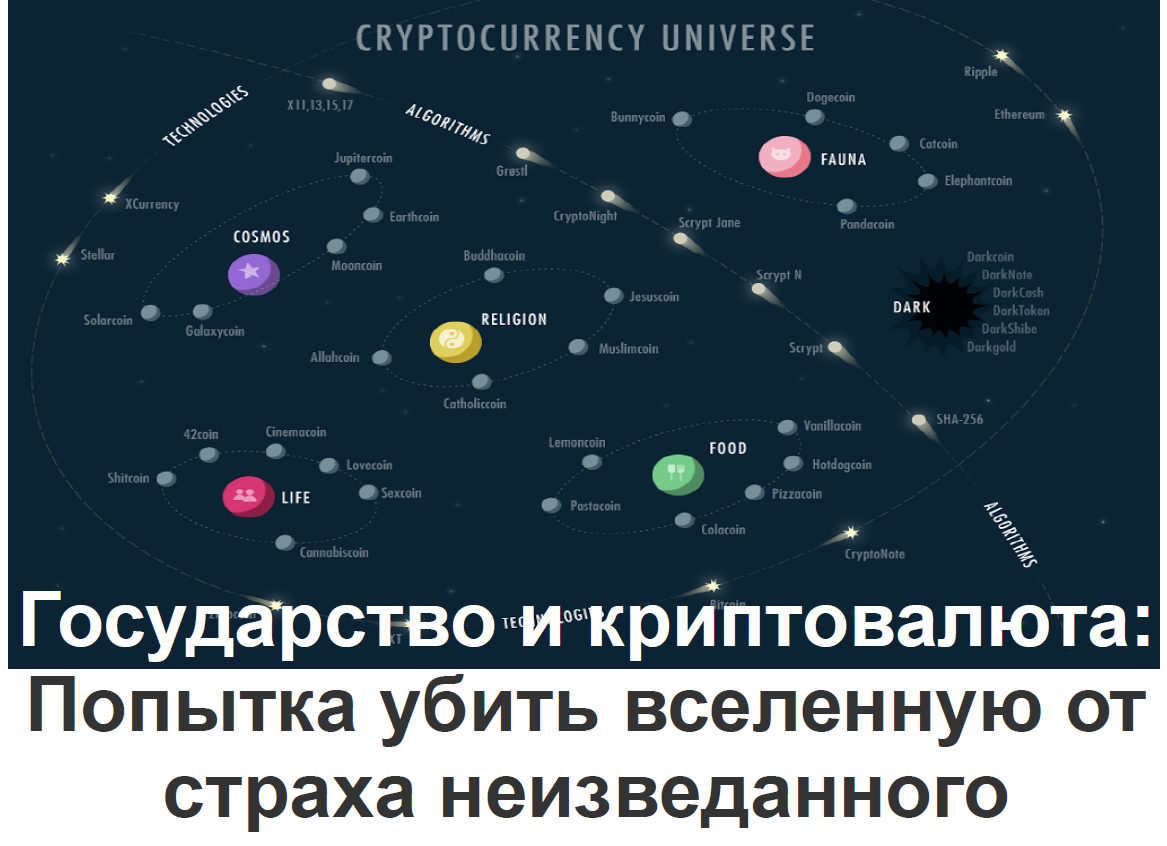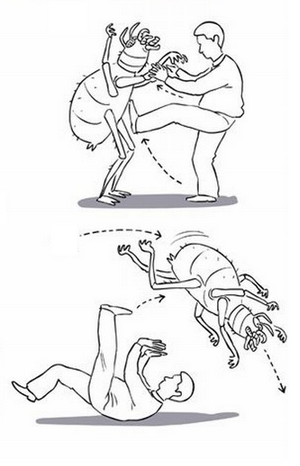State Mandate to Kill the Universe and Counteract This (report at Bitcoin Conference Russia 2015)

Below is the report, which was presented at the Bitcoin Conference Russia 2015 on April 2 in Moscow.
Representatives of state bodies in Russia in the past year have seriously worried about the spread of cryptocurrency and the technologies on the basis of which they function among Internet users.
Most of those statements and publications that fall into the information space were critical or at least cautious of state authorities regarding the prospects for the functioning of the same Bitcoin in the legal space.
')
Unfortunately, at present, the point of view repressed by the state on the part of the cryptocurrency still wins .
What were the prerequisites for this, if you look from the point of view of state institutions?
Something new (conservatism)
The state itself is a conservative institution and is at least skeptical and wary of everything new. To include a reform mechanism, even in a narrow sector, serious will on the part of ministries, departments and legislators is necessary.
As with the Internet as a whole, the state, seeing that it cannot completely subordinate it to itself (control it), decides that it is simpler to prohibit certain tools of human interaction in it than to integrate it into its regulatory system.
Something opaque in the conventional sense of gos.fin. institutions
Without certain knowledge of cryptocurrency technology, officials by default perceive all of its forms as completely opaque to monitor transactions.
How to collect taxes from crypto transactions?
Each business transaction must be paid one or another type of tax. How the data will be provided by business structures that use cryptocurrency to carry out transactions - the state does not represent and no one explains to it.
 Instrument of financing undesirable persons and organizations
Instrument of financing undesirable persons and organizations(terrorists and radicals, oppositionists (“color revolutions”, drug mafias, laundering of dubious incomes, etc.)
The most frequent arguments, horror stories from the mouths of representatives of state authorities. But they all break down on the argument that all these target groups primarily use cash, which is much more difficult to trace the origin of than the cryptocurrency transaction chain.
Cryptocurrency is a tool and you can’t blame the hammer for killing them in everyday life and torturing them with an iron.
Malware Distribution
Relatively new argument. “Kaspersky Lab” in its report reported that the registration files of virtual transactions in working with cryptocurrency in distributed systems can be used to host malicious software or other illegal content.
However, any other transactions on the Internet do not exclude this.
Citizens' rights are not protected in cryptocurrency transactions and transfers.
There is no legislative regulation - there are no rights for citizens to protect their interests when they are violated. In general, we can agree, if you do not take into account that the use of cryptocurrency is voluntary, but, nevertheless, as long as there is no legislative base - all this looks (on the part of the state) as illegal games.
Relatively speaking, losing money in clandestine poker is a person who is guilty himself and he understands this, but for the state there is a growing danger that this may push this person to other illegal actions. Those. carries danger to society.
Therefore, it is logical that the state thought about the issue of state regulation of cryptocurrency circulation
And, unfortunately, at present such regulation is poured in the development of a draft law on the actual equalization of cryptocurrency to money substitutes and their total prohibition to use with the imposition of sanctions otherwise.
Such a repressive approach began to take shape after the statements of the Central Bank of the Russian Federation a year ago:
“Recently, so-called“ virtual currencies ”, in particular, Bitcoin, have gained some acceptance in the world. For “virtual currencies” there is no provision and legally obliged subjects for them. Operations on them are speculative in nature, carried out on the so-called "virtual exchanges" and carry a high risk of losing value.
The Bank of Russia warns citizens and legal entities, first of all, credit organizations and non-credit financial institutions, against using “virtual currencies” to exchange them for goods (work, services) or for money in rubles and in foreign currency. ”
 The Bank of Russia also threatened with the law:
The Bank of Russia also threatened with the law:“According to article 27 of the Federal Law“ On the Central Bank of the Russian Federation (Bank of Russia) ”, the issue of money substitutes in the territory of the Russian Federation is prohibited.
Due to the anonymous nature of the activity of issuing “virtual currencies” by an unlimited number of subjects and using them to perform operations, citizens and legal entities may be, inadvertently, involved in illegal activities, including legalization (laundering) of proceeds from crime, and the financing of terrorism.
The Bank of Russia warns that the provision of services by the Russian legal entities for the exchange of “virtual currencies” for rubles and foreign currency, as well as for goods (works, services) will be considered as a potential involvement in carrying out suspicious operations in accordance with the legislation on counteracting legalization (laundering) criminal proceeds and the financing of terrorism. ”
This was the first official equating cryptocurrency to a money surrogate.
On the same day, Cetrobank made a counter-statement from the head of Sberbank, German Gref , who stood up for Bitcoin:
“This is a very interesting global experiment that breaks the paradigm of issuing money,” Gref believes, “the Bitcoin ban will be a huge step backwards.” This virtual currency "definitely should not be prohibited", it "needs to be studied and, possibly, properly regulated"
At the beginning of February 2014, the working group at the General Prosecutor's Office, together with the Central Bank, the Ministry of Internal Affairs and the FSB, considered the issue of the existence and circulation of cryptocurrencies, summarizing specific decisions “aimed at preventing violations of the property rights of citizens and organizations related to the use of cryptocurrencies and determine work on the legal regulation of this area. "
Later , a statement was made by the head of the State Drug Control Agency that “Virtual Bitcoin, among other payment systems, is increasingly being used by the drug mafia to make payments on the sale of drugs.”
In July of last year, Georgy Luntovsky, the first deputy chairman of the Bank of Russia , speaking at the International Banking Congress, said that it was possible to resolve the cryptocurrency turnover at the national level. He stated the following: “We are supporters of a careful approach to BitCoin. Together with the Bank for International Settlements, we monitor this situation. You can not reject this tool, perhaps for him the future. As information accumulates, we will decide on BitCoin. We are currently working with the government to study this issue. Perhaps, after some time, we will take a decision on legislative regulation of this issue. ”
But already in August, on the public discussion portal Regulation.gov.ru, it was reported that the Ministry of Finance, on behalf of the first deputy chairman of the Government of the Russian Federation, Shuvalov, had begun to draft a law on actually banning the circulation of cryptocurrency (virtual currency) in Russia.
During the expert discussion , more than a hundred criticisms were received of such a prohibitive approach to the use of cryptocurrency. But all of them were not taken into account, and already in February of this year, public discussion of the very text of the law itself was launched.
Which makes changes to the Administrative Code, the law “on the Central Bank of the Russian Federation” and the law “on information” and imposes fines on individuals (up to 50 tr.) And on officials (up to 100 tr.) And on legal entities ( up to 1 million rubles.) for the release of money substitutes, the creation and distribution of software in order to release, the dissemination of information about how virtual currencies work and for carrying out transactions with them.
Also, the Central Bank of the Russian Federation is given the opportunity to carry out extrajudicial blocking of sites with information on the release of “money surrogates” and on their use.
Again, on the part of experts, dozens of criticisms were voiced on this text of the draft law.
The Ministry of Economic Development has given a negative decision on the results of the ODS procedure of the draft law on the prohibition of virtual currencies and cryptocurrencies in the Russian Federation in particular:
“Under these conditions, the regulation proposed by the draft act does not solve the tasks set by these instructions, but only contributes to the creation of legal barriers to the implementation of marketing programs of business entities and the development of entrepreneurial activity in general.
Based on the assessment of the regulatory impact of the draft act, taking into account the information provided by the developer in the summary report, the Ministry of Economic Development of Russia concluded that there was insufficient justification for solving the problem stated by the developer, the method proposed by the draft act, as well as the presence of provisions that introduce excessive administrative and other restrictions and responsibilities for subjects of entrepreneurial and other economic activities or contribute to their introduction, as well as contribute to the emergence of unfounded expenses of subjects of entrepreneurial and other economic activities or contribute to the emergence of unreasonable expenses of budgets of all levels of the budget system of the Russian Federation. ”
Also, as a result of additional public consultations, negative reviews were received from Mobile TeleSystems OJSC, MegaFon OJSC, Russian Railways OJSC, and the National Payment Council Association .
Nevertheless, the text has undergone only technical changes, leaving all those norms and prohibitions that were laid in it initially, except that having derived the so-called bonus points beyond the law.
And it satisfied the Ministry of Economic Development, albeit with reservations. And this ministry has already received a positive assessment of this draft law.
All this happened on a negative background for Bitcoin enthusiasts and companies.
In January, Roskomnadzor entered into the register of prohibited sites and ordered telecommunications operators to block 7 bitcoin portals bitcoin.org, indacoin.com, coinspot.ru, hasbitcoin.ru, bitcoinconf.ru, bitcoin.it, btcsec.com
It turned out that as early as September 2014, a decision was taken by the city court of the Sverdlovsk region to ban these sites, according to the local prosecutor's office.
Also began to appear and the political statements of the State Duma deputies on cryptocurrency.
State Duma Deputy of "Fair Russia" Andrei Krutov :
“Cryptocurrencies threaten Russia's financial stability and financial sovereignty.”
State Duma deputy from the Liberal Democratic Party Andrei Svintsov :
"All these cryptocurrencies are created by the American special services just to finance terrorism and color revolutions."
All this, naturally, does not give prospects for the state understanding of how cryptocurrencies can be used to give them legitimate status and blackens the very idea of developing this kind of promising technologies for society and business structures.

What then to do?
-> Do not go to yourself
-> Use available exposure tools yourself. Create and sign petitions, participate in open public discussions. Yes, it is possible at this stage of the development of e-democracy tools they have not quite gained the necessary influence on government bodies, but nevertheless it is necessary to come to them en masse and build a foundation for further increasing public pressure with upholding their positions.
OR
-> Delegate assertion of their rights to lobby groups:
- the creation of various forms of associations, alliances, organizations;
- crowdsourcing (collective intelligence);
- crowdfunding / financing of this kind of project and current activities of lobbying the interests of the industry.
-> Legal struggle in the courts . Organization of legal advice and lawyer assistance.
-> Information "war" on the web. Likbez and propaganda. Try to convey positive meanings for all categories of society, business and government.
Using cryptocurrency, we make it legitimate for ourselves.
But this at least brings stagnation of the legal development of the mechanisms of new public relations. And most likely it will lead to a regress of an adequate perception of these tools from all other persons not involved in the process of using cryptocurrency.
To make a cryptocurrency legitimate for everyone, you need to act:
To unite and create a strong lobby for the upholding of both their rights and the implementation of new technologies.
State and cryptocurrency. An attempt to kill the universe from the fear of the unknown
Additional materials on the conference itself:
Bitnovosti.com - The future of cryptocurrencies was discussed in Moscow: a report from Bitcoin Conference Moscow
Bankir.ru - The end of bitcoins in Russia. Some industry players believe that they need to fight, others do not see the point
ITexpert.org.ua - Bitcoin community should think about creating its own strong lobby
Forklog.com - Direct text (+ photo) broadcast Bitcoin Conference Russia
Bits.Media - Report on Bitcoin Conference Russia in Moscow
The conference organizers promised to provide a video broadcast of the conference in the near future.
I also ask everyone to take part in such a questionnaire on the topic: “Bitcoin in Russia and neighboring countries”
UPD
Video from the legal section Bitcoin Conference Russia 2015
(Sorry for the excessive external severity of my)))
All additional materials from the conference and other videos from it:
bitcoinconf.moscow/ru #results
Source: https://habr.com/ru/post/254905/
All Articles